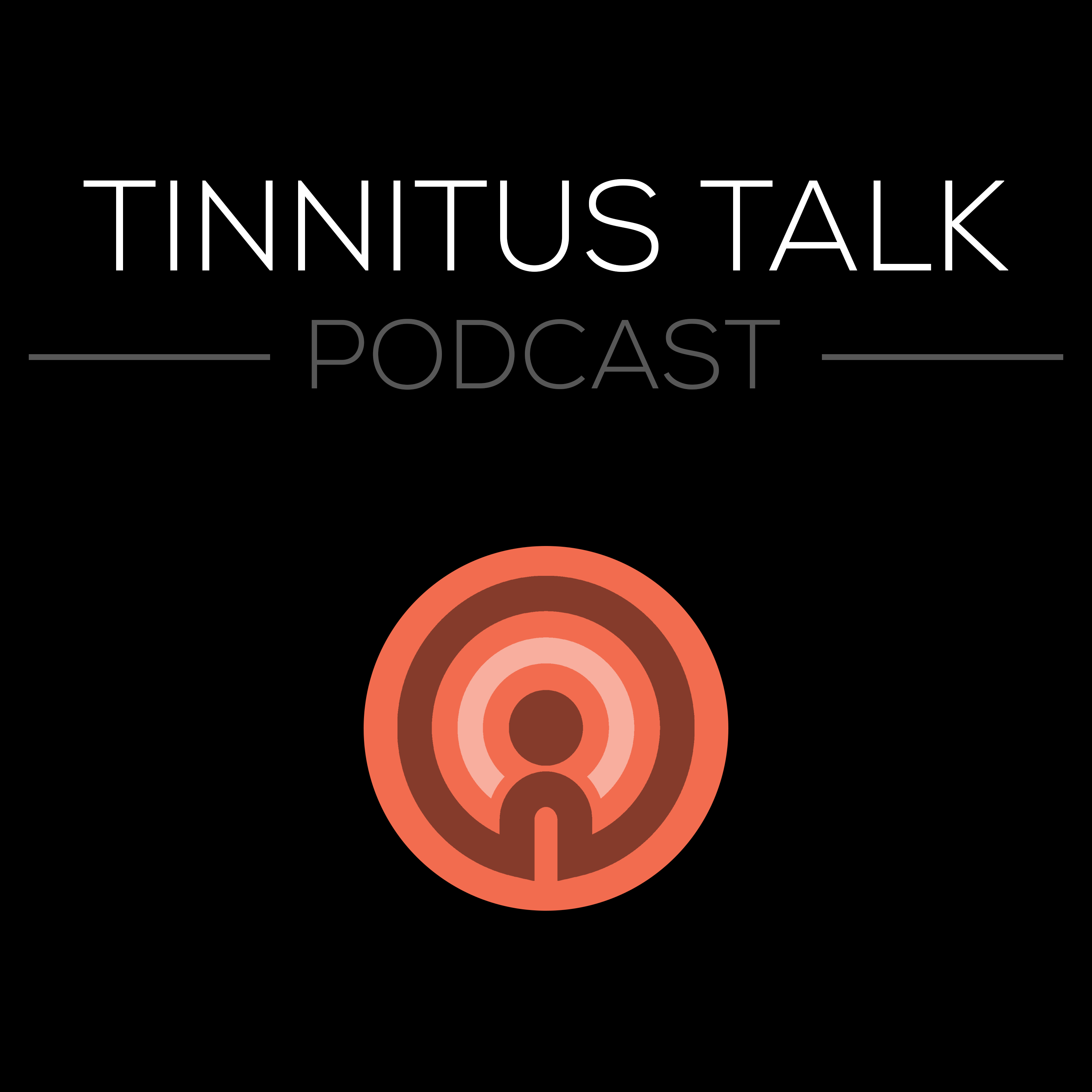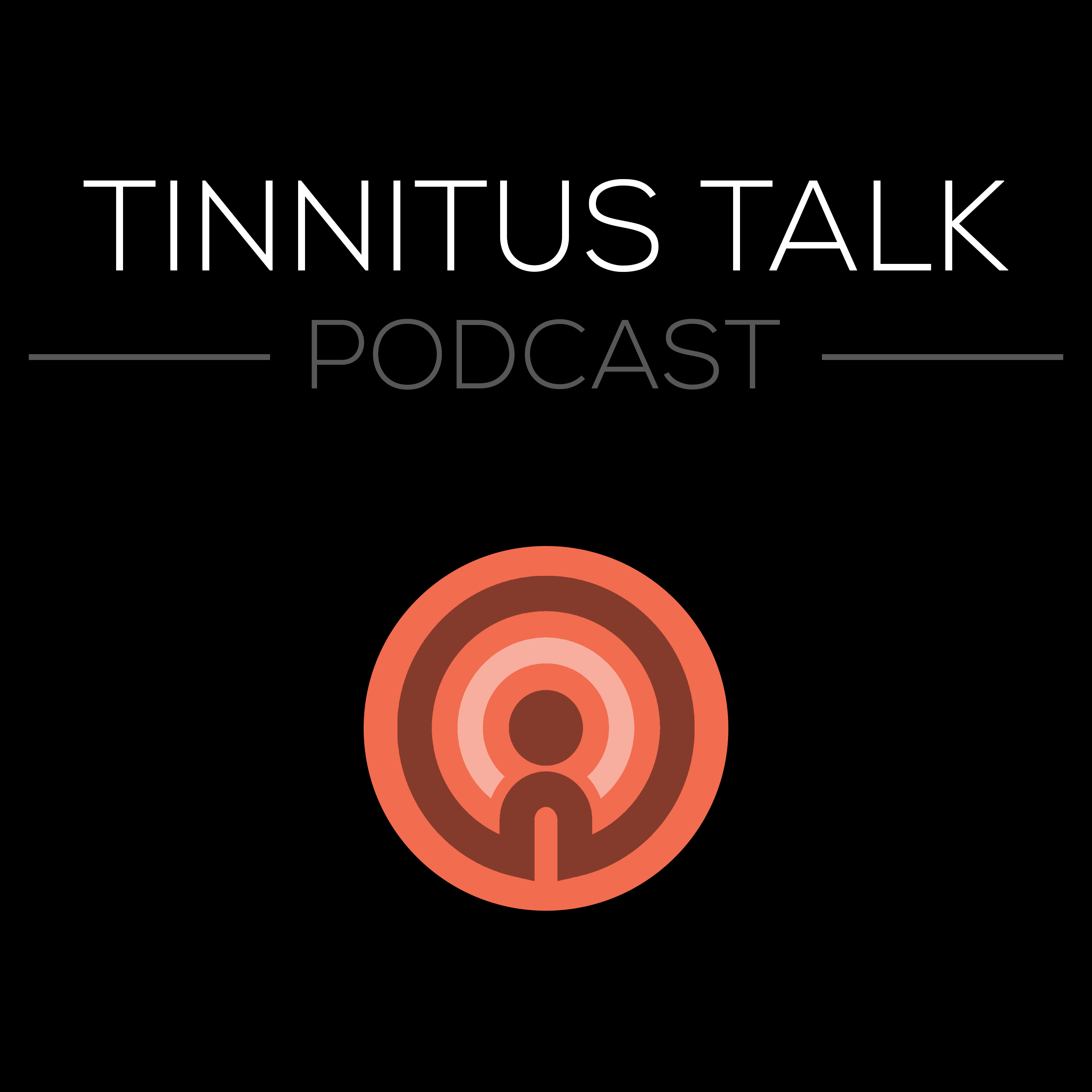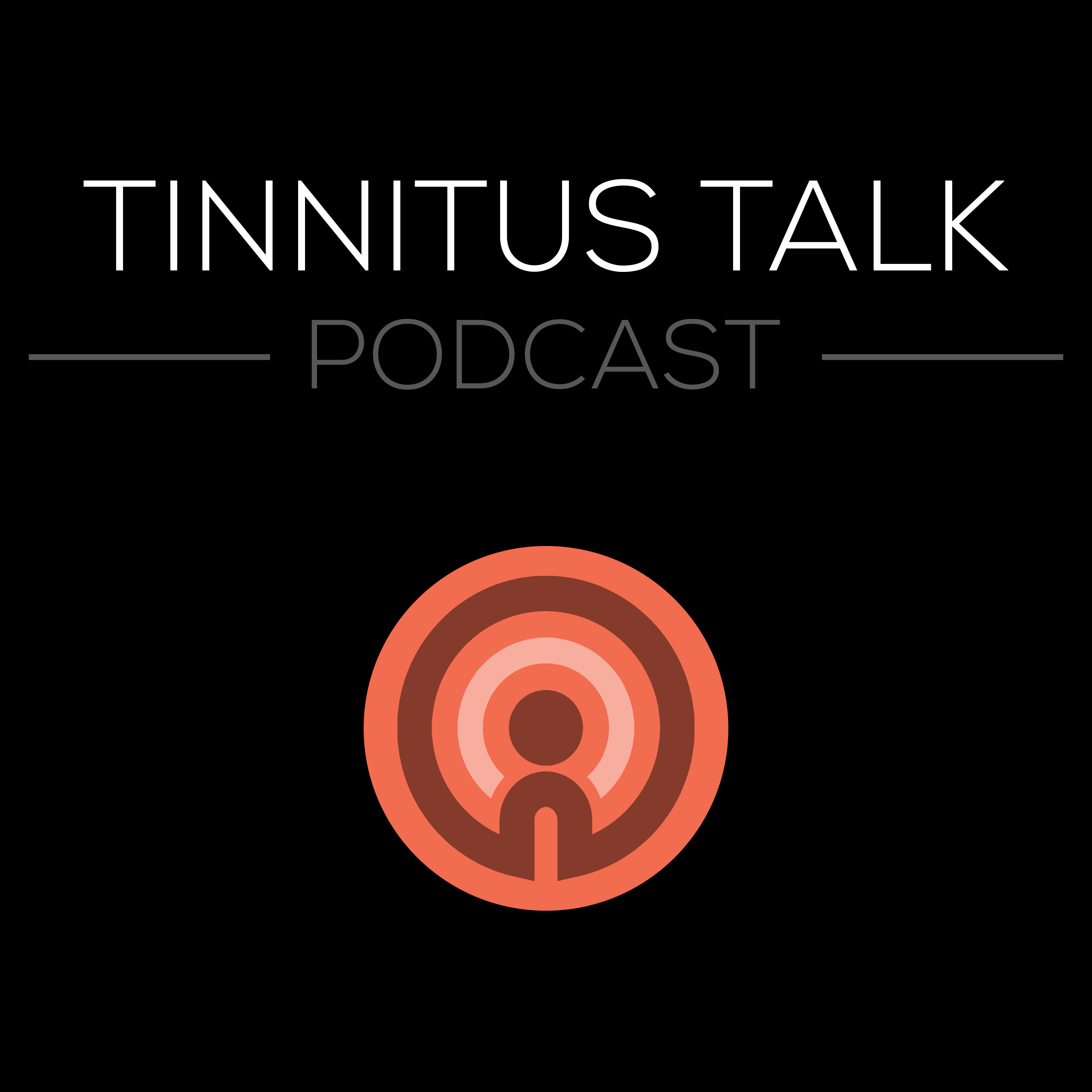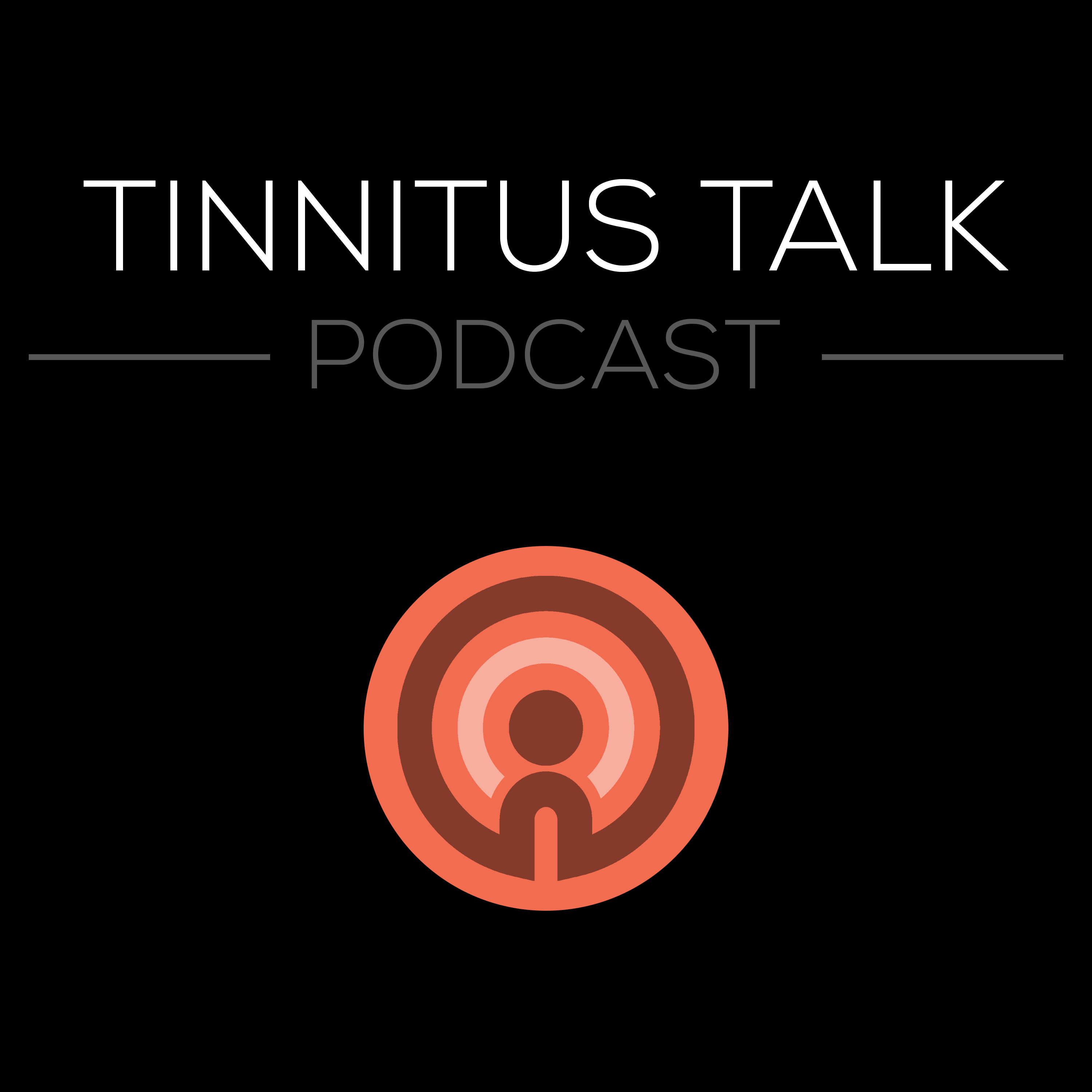Discover Tinnitus Talk
Tinnitus Talk

Tinnitus Talk
Author: Tinnitus Hub
Subscribed: 91Played: 1,081Subscribe
Share
© Copyright 2023 All rights reserved.
Description
Tinnitus Talk is a podcast about all things tinnitus. We aim to engage and inform you, bringing you fresh insights and updates on research, treatments, personal experiences and public awareness.
Our hosts (who all have tinnitus themselves) interview tinnitus researchers, healthcare providers and advocates. We bring you real life stories from tinnitus patients. And we’ll update you on the latest developments in the field and in the patient community.
Tinnitus Talk is a brand owned by Tinnitus Hub.
Visit TinnitusTalk.com to join our online patient forum!
Our hosts (who all have tinnitus themselves) interview tinnitus researchers, healthcare providers and advocates. We bring you real life stories from tinnitus patients. And we’ll update you on the latest developments in the field and in the patient community.
Tinnitus Talk is a brand owned by Tinnitus Hub.
Visit TinnitusTalk.com to join our online patient forum!
23 Episodes
Reverse
We often talk about the lack of research and funding for tinnitus. But what about the quality of research? Do tinnitus sufferers benefit from the research that is conducted? In reality, many studies are conducted improperly, thus giving misleading results and false promises for patients.During this episode, we dive deep into concepts like research design, patient selection, outcome measures, statistical analysis, and everything else required for high-quality studies. We focus on studies that assess tinnitus interventions; in other words, studies that measure the effectiveness of new treatments. How do we ensure that such studies generate valuable information for patients?We discuss these topics with Inge Stegeman, an epidemiologist from the University of Utrecht, and Jorge Simões, Assistant Professor in data science and mental health at the University of Twente.(00:00) Why Is This Topic Important?(16:15) Things That Can Go Wrong in Designing a Study(24:55) How Do We Measure the Success of Clinical Trials?(35:54) Open Science and the Importance of Being Systematic(39:24) Breaking Out of Research Silos(46:04) The Importance of Negative Results(49:43) Being Honest About Study Outcomes(55:59) Reasons for Optimism(58:39) Unifying Tinnitus ResearchBecome a Tinnitus Talk Podcast Patron at https://moretinnitustalk.com for bonus content, video interviews, Ask an Expert series, and more!
We revisited with an old friend of the podcast: Dr. Josef Rauschecker. He was our first ever guest – go back and listen to that episode! – who came up with the famous 'gating' theory of tinnitus. Josef’s gating theory poses that while neural ‘noise’ may arise in the ear and lower brain regions due to hearing loss, this noise is typically cancelled out further up the auditory pathway. For most people at least, but not for those experiencing tinnitus.We speak to Josef in person at his office in Georgetown University about how his theory has evolved, his views on psychological treatments for tinnitus, why animal studies for tinnitus often fail, and how we can quickly get new tinnitus medications to market.(00:00) Introduction(02:23) Explaining the 'Gating' Theory(06:55) Tinnitus Disorder(09:31) Recent Insights from MRI Studies(12:06) Psychological Treatments for Tinnitus(15:49) Animal Models to Cure Tinnitus(21:04) Speeding Up New Treatments(27:08) Lidocaine Cures Tinnitus?(30:18) New Funding OpportunitiesBecome a Tinnitus Talk Podcast Patron at https://moretinnitustalk.com for bonus content, video interviews, Ask an Expert series, and more!
Maybe you heard of sound therapy devices like Neuromonics, Desyncra, and SoundCure? Or more recently, Lenire? Hazel talks to Steve Harrison, a musician and audiophile who has suffered from severe tinnitus for decades. Steve knows all about the use of sound for tinnitus relief.Rather than relying on expensive devices, which typically can only do one thing, Steve recommends experimenting with sound and gives practical tips for doing so. We go through all the different types of sound therapies and treatments and discuss the pros and cons.Check out Steve’s YouTube channel Tinnitus Works and the TinnitusPlay app (iPhone only).Become a Tinnitus Talk Podcast Patron at https://moretinnitustalk.com for bonus content, video interviews, Ask an Expert series, and more!
Meet Brian Fargo, a successful video game developer who – when he developed tinnitus – tried every imaginable treatment to get rid of it, to no avail. Frustrated at the lack of effective treatment options, he decided to put his money where his mouth is.He funded the research of Dr. Hamid Djalilian from UC Irvine, who is testing electrical stimulation of the inner ear to alleviate tinnitus. His results so far seem very promising, with some patients even getting rid of their tinnitus completely.This episode is all about one man’s journey to come to terms with his tinnitus and help others by providing much needed research funding.Become a Tinnitus Talk Podcast Patron at https://moretinnitustalk.com for bonus content, video interviews, Ask an Expert series, and more!
We hear figures of up to 20-30% of the population supposedly having tinnitus, but is tinnitus really that prevalent? In this episode, we learn that such data is based on population studies where people are asked questions like “have you heard ringing in your ears for more than 5 minutes in the past year?”. That’s not helpful data. When it comes to finding better treatments, we need to zoom in on chronic, severe tinnitus.We talk about the need for bigger and better data for tinnitus with Christopher Cederroth, a researcher who focuses on the genetic underpinnings of tinnitus, and David Stockdale, the chief executive of the British Tinnitus Association.Existing data from biobanks has already taught us a fair bit about tinnitus, for instance that chronic tinnitus tends to be persistent over the years. But we need better tinnitus definitions than the “5 minutes” one, we need larger sample sizes, and higher quality data on for instance hearing profiles. You can take part and contribute your data too!Become a Tinnitus Talk Podcast Patron at https://moretinnitustalk.com for bonus content, video interviews, Ask an Expert series, and more!
Living with tinnitus can be tough. It’s also different for everyone, and our experiences tend to change over time. This episode – and there will be similar ones in future – features two people’s stories: Steve and Sean.Both talk openly about how badly tinnitus affected them, but also how they ultimately learned to live with it. We talk extensively about how “learning to live with it” does not necessarily mean everything is fine. But it can mean the difference between pure suffering and leading a normal, though somewhat compromised, life.Steve and Sean also cover tips and tricks for coping with the challenges posed by tinnitus and hyperacusis; how useful (or not) the medical profession has been for them; and how to deal with a lack of understanding from those around you.Become a Tinnitus Talk Podcast Patron at https://moretinnitustalk.com for bonus content, video interviews, Ask an Expert series, and more!
Prof. Dirk De Ridder is one of the most cited tinnitus researchers, a very eloquent speaker, and a passionate advocate for people with tinnitus. He also runs his own brain research centre and clinic Brai3n.We spoke with Dirk about how the brain can create phantom perceptions like pain and tinnitus, and the different schools of thought in this area. He also highlights the role of epigenetics and explains how tinnitus can become intertwined with our sense of self, and how effective treatment should attempt to break that connection.In terms of clinical work, he describes how he works with patients and what he can offer them. Although he does not see Lenire and similar devices as the solution, he does see promising developments in psychedelics-based treatments and suppressing chronic neuroinflammation.Become a Tinnitus Talk Podcast Patron at https://moretinnitustalk.com for bonus content, video interviews, Ask an Expert series, and more!
Very few commercial drug companies focus on hearing disorders. Even fewer focus on tinnitus. Otonomy does both. In this exclusive interview, we took a deep dive with Otonomy’s executives into their drug pipeline.We spoke to David Weber (PhD), President and CEO, and Alan Foster (PhD), Chief Scientific Officer. They shared their views on what they see as the “renaissance” of hearing research and how there is currently more investor appetite to address hearing issues. We discussed why Otonomy is not only seeking solutions for different kinds of hearing loss, but also tinnitus specifically.The interview covers each of the company’s drugs in-depth, from its mechanism of action to commercialization plans. Tinnitus drug OTO-313 targets overexcitation of the auditory nerve, which is theorized to cause tinnitus. Which types of tinnitus will benefit remains an open question, but the tinnitus community will no doubt follow the drug’s future with keen interest.Become a Tinnitus Talk Podcast Patron at https://moretinnitustalk.com for bonus content, video interviews, Ask an Expert series, and more!
A major obstacle to developing better treatments for tinnitus is the lack of a test or measure that can objectively assess whether someone has tinnitus and how severe it is. Making tinnitus measurable allows researchers to more easily assess the effectiveness of new treatments and meet the expectations of regulators in order to get those treatments to market.We spoke with Mehrnaz Shoushtarian (PhD) from the Bionics Institute in Australia, who are working on an objective measure of tinnitus based on Functional near-infrared spectroscopy (fNIRS) and a machine learning program. They believe that their technique will not only be able to distinguish whether someone has tinnitus or not, but also how loud it is.We cover the technical ins and outs of the objective measure, the underlying theories the work is based on, the future commercialisation of the technique, and the ultimate impact the Bionics Institute is hoping for.Become a Tinnitus Talk Podcast Patron at https://moretinnitustalk.com for bonus content, video interviews, Ask an Expert series, and more!
The two conditions are eerily similar: visual snow and tinnitus. The patient experience is often one of being misunderstood, and research is in its infancy. What can be done? Two pioneers in this field, patient advocate Sierra Domb and neurologist Dr Peter Goadsby, talk about their incredible experiences in trying to push the envelope for visual snow sufferers.Become a Tinnitus Talk Podcast Patron at https://moretinnitustalk.com for bonus content, video interviews, Ask an Expert series, and more!
This episode is an opportunity to learn about what’s going on in the brain of someone with tinnitus. Dr Will Sedley explains, in very clear and easy-to-understand terms, his own theory on the mechanisms underlying tinnitus, as well as the main other theories in the field.We also cover topics like: the factors that trigger the onset of tinnitus, whether there are many different causes of tinnitus or really only one, the analogy with other conditions like chronic pain, the reliability of animal models, the need for an objective marker of tinnitus, and the thorny issue of whether tinnitus subtypes really exist.Understanding the origins of tinnitus is key to developing better treatments, which is why we’d like to see more neurologists follow Will Sedley’s lead.Become a Tinnitus Talk Podcast Patron at https://moretinnitustalk.com for bonus content, video interviews, Ask an Expert series, and more!
The company we interviewed for this episode, Frequency Therapeutics, is the subject of the most active thread on the Tinnitus Talk forum, with nearly 1 million views. So of course, we wanted to hear from directly!Frequency Therapeutics is working on a new hearing regeneration treatment. Preliminary results suggest the drug might work particularly well to improve speech intelligibility, something which traditional hearing aids have not been able to achieve.We spoke with Carl LeBel, PhD, the company’s Chief Development Officer, about how the drug was discovered, whether it might benefit tinnitus, and why speech intelligibility should be the primary measure of hearing. We also touch on the burning question of when FX-322 might hit the market.Become a Tinnitus Talk Podcast Patron at https://moretinnitustalk.com for bonus content, video interviews, Ask an Expert series, and more!
A drug to quieten your tinnitus. It’s what most people struggling with tinnitus desire. We had the pleasure of interviewing Thanos Tzounopoulos, PhD, director of the Pittsburgh Hearing Research Center, on his work to develop just such a drug.His work builds on the previously somewhat successful off-label tinnitus drug Retigabine. That drug was taken off the market due to severe side effects. Thanos is now attempting to re-develop it, without the side effects, and better targeted at the source of the neural hyperactivity perceived as tinnitus.In this episode, we speak extensively about Thanos’ theory of how tinnitus is generated in the brain and the role of (broken) potassium channels in this. He explains all the trial and error that went into re-developing the drug and speaks about the upcoming phases of research needed before the drug can come to market.Become a Tinnitus Talk Podcast Patron at https://moretinnitustalk.com for bonus content, video interviews, Ask an Expert series, and more!
This episode is quite different than what we’ve done before. You’ll hear from four people with tinnitus about how the current situation, being quarantined, has affected their lives and their tinnitus. One of these people was infected with the Coronavirus and describes how it affected his entire family and impacted his tinnitus.We also spoke with a researcher, Raj Shekhawat, about how the crisis has affected tinnitus research because of clinical trials being stalled. And we spoke with Alan Hopkirk, an audiologist who has now shifted his patient support efforts completely online.Through this compilation episode, we are aiming to connect with all of you out there who are feeling isolated!Become a Tinnitus Talk Podcast Patron at https://moretinnitustalk.com for bonus content, video interviews, Ask an Expert series, and more!
Tinnitus Talk spoke with the Hough Ear Institute, a non-profit research organization that focusses on restoring hearing. They are working on two hearing regeneration treatments that could very well have benefits for tinnitus sufferers.In this episode, we spoke with Dr. Richard Kopke and Justin DeMoss. They explain the mechanisms behind their treatments and how hearing restoration can be achieved. They take us through the different phases of research and development required to get new drugs to market, and some of the challenges faced along the way. Of course, we also touch on the topic of whether restoring hearing could cure tinnitus.The episode includes an announcement about an exciting new partnership with pharmaceutical company Oblato to take Hough’s hearing loss pill through the next phases of clinical trial and assess its potential for tinnitus.Become a Tinnitus Talk Podcast Patron at https://moretinnitustalk.com for bonus content, video interviews, Ask an Expert series, and more!
Tinnitus Talk spoke with Bryan Pollard, the president of Hyperacusis Research Limited, based in Boston. Bryan himself suffers from hyperacusis, which he believes is due to sound exposure from a loud woodchipper several years ago.In this episode, Bryan talks about his personal experience with hyperacusis, and how this drove him to start Hyperacusis Research to raise funds for scientific research.We spoke about the concept of pain hyperacusis and how it only recently became recognized due to the scientific breakthrough proving that the cochlea has pain receptors. Bryan also gives advice to hyperacusis patients regarding treatment options. And of course, we spoke about the most exciting new research developments.Become a Tinnitus Talk Podcast Patron at https://moretinnitustalk.com for bonus content, video interviews, Ask an Expert series, and more!
It’s been the talk of the town on the Tinnitus Talk forum for the past few months: the launch of Neuromod’s Lenire treatment for tinnitus. We got a chance to sit down with their CEO Dr. Ross O’Neill and ask him everything (well, nearly) you want to know about this device.It’s an extra-long episode, because so many questions were raised on our forum about Lenire – the thread has been viewed over half a million times – that we felt we needed to do our best to gather as many answers as possible.In the episode, Hazel and Ross talk about the basic principles of the treatment, its effectiveness, and risks. We also covered clinical trial results and go in-depth on what the treatment actually looks like. We clarify whom Lenire is suitable for, and Ross makes some projections about future roll-out of the device.Become a Tinnitus Talk Podcast Patron at https://moretinnitustalk.com for bonus content, video interviews, Ask an Expert series, and more!
What is the current state of evidence in favour or against tinnitus treatments on the market? Which treatments have been thoroughly tested and which require more testing? What should doctors and patients learn from this? And how should this inform new tinnitus research? These are all questions answered in this episode!Tinnitus Talk spoke with Rilana Cima and Derek Hoare, two of the co-authors of the European Clinical Practice Guidelines for Tinnitus, which were published earlier this year. Clinical Guidelines are recommendations for healthcare professionals on how to diagnose and treat a medical condition, based on currently available evidence.The episode makes clear that the vast majority of treatments currently on the market have not been sufficiently studied to tell one way or the other how effective and safe they are. There is a dire lack of thorough clinical trial data available, which severely hinders clinical management of tinnitus. Doctors are often not aware of different treatment options, and patients have to find their own way through the system.If you are currently seeking medical treatment for tinnitus, make sure you are aware of any relevant Clinical Guidelines.Become a Tinnitus Talk Podcast Patron at https://moretinnitustalk.com for bonus content, video interviews, Ask an Expert series, and more!
What are stem cells and how can stem cells treat hearing loss? What’s going on with human trials for hearing regeneration? When can we expected new treatments on the market? And will regenerating hearing resolve tinnitus? These kinds of questions will be answered in this podcast!Tinnitus Talk spoke with Marcelo Rivolta, professor of Sensory Stem Cell Biology at the University of Sheffield. He explains the basic concepts of stem cells and the different approaches to hearing regeneration. It’s fascinating science, but there are a number of roadblocks to be cleared before patients can benefit.Marcelo also announces that he received a research grant and used it to start a biotechnology company called Rinri. If you want to stay up to date with the progress of Rinri, please visit https://rinri-therapeutics.com.The interview with Marcelo was conducted by Steve Harrison (Tinnitus Talk) and David Stockdale (British Tinnitus Association). As added bonus material at the end, Hazel and Markku discuss the Tinnitus Talk podcast ‘behind the scenes.’Become a Tinnitus Talk Podcast Patron at https://moretinnitustalk.com for bonus content, video interviews, Ask an Expert series, and more!
How can clinicians and patients work together? Why is tinnitus sub-typing important? Does loudness matter? What does habituation really mean? What different forms of counselling and treatment are available for tinnitus? These are some of the questions addressed in this episode.Tinnitus Talk spoke with Richard Tyler, from the University of Iowa. His career in tinnitus spans many decades. He has vast experience in both tinnitus research and patient care and is passionate about connecting those two worlds.Richard also talks about the annual conference on tinnitus management that he is organising this year for the 27th time in Iowa. The conference is open to patients.Become a Tinnitus Talk Podcast Patron at https://moretinnitustalk.com for bonus content, video interviews, Ask an Expert series, and more!
























